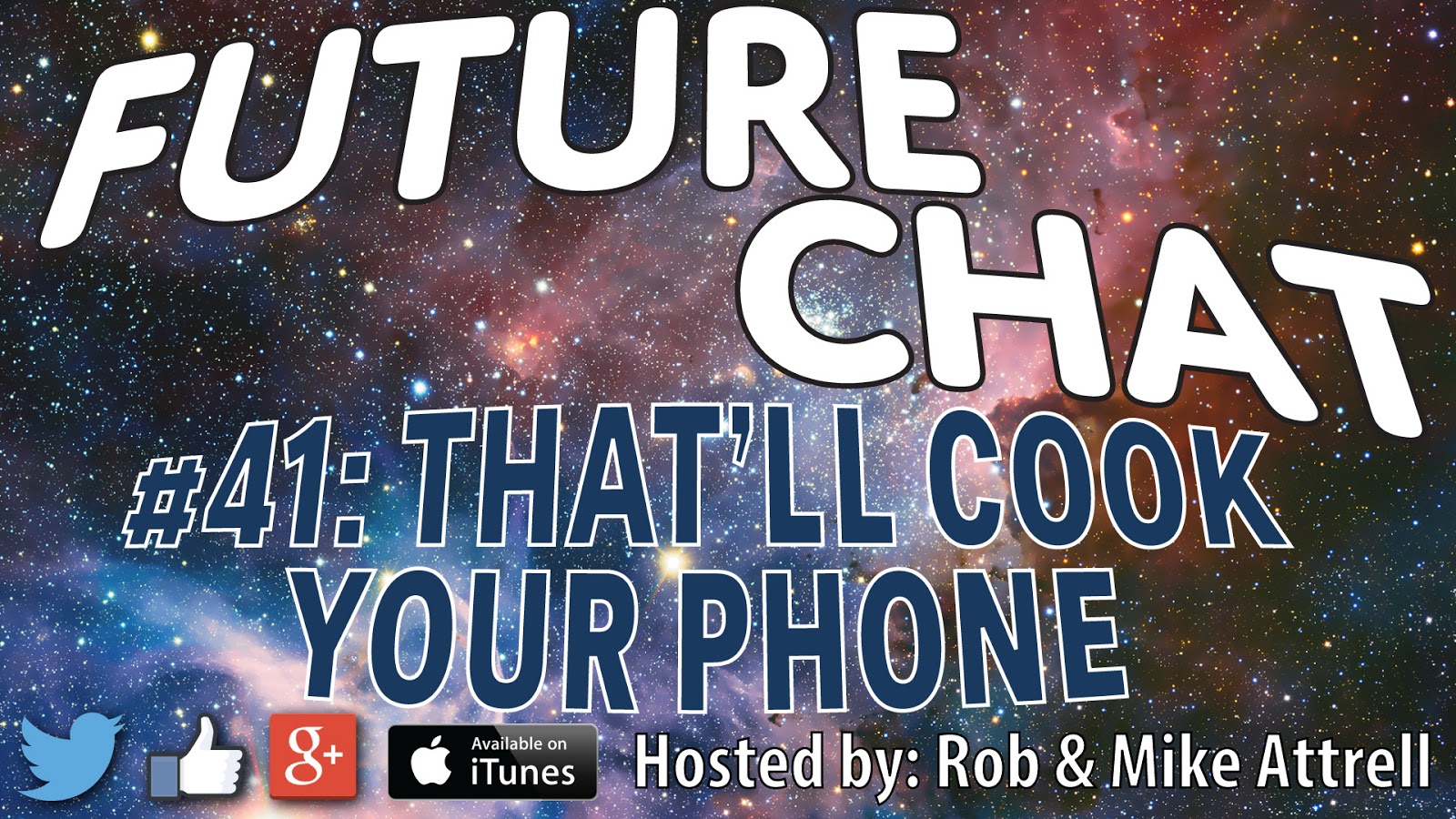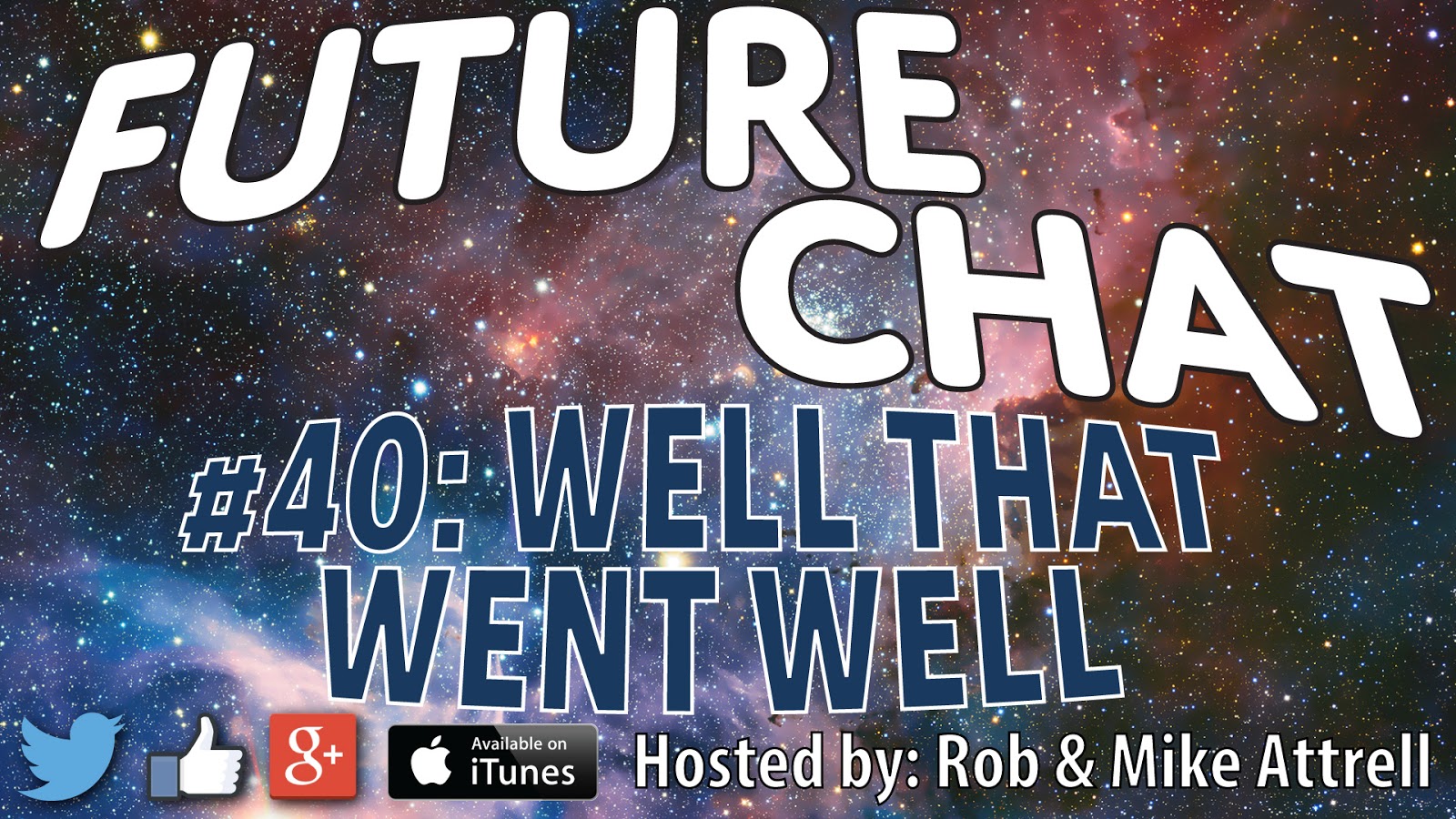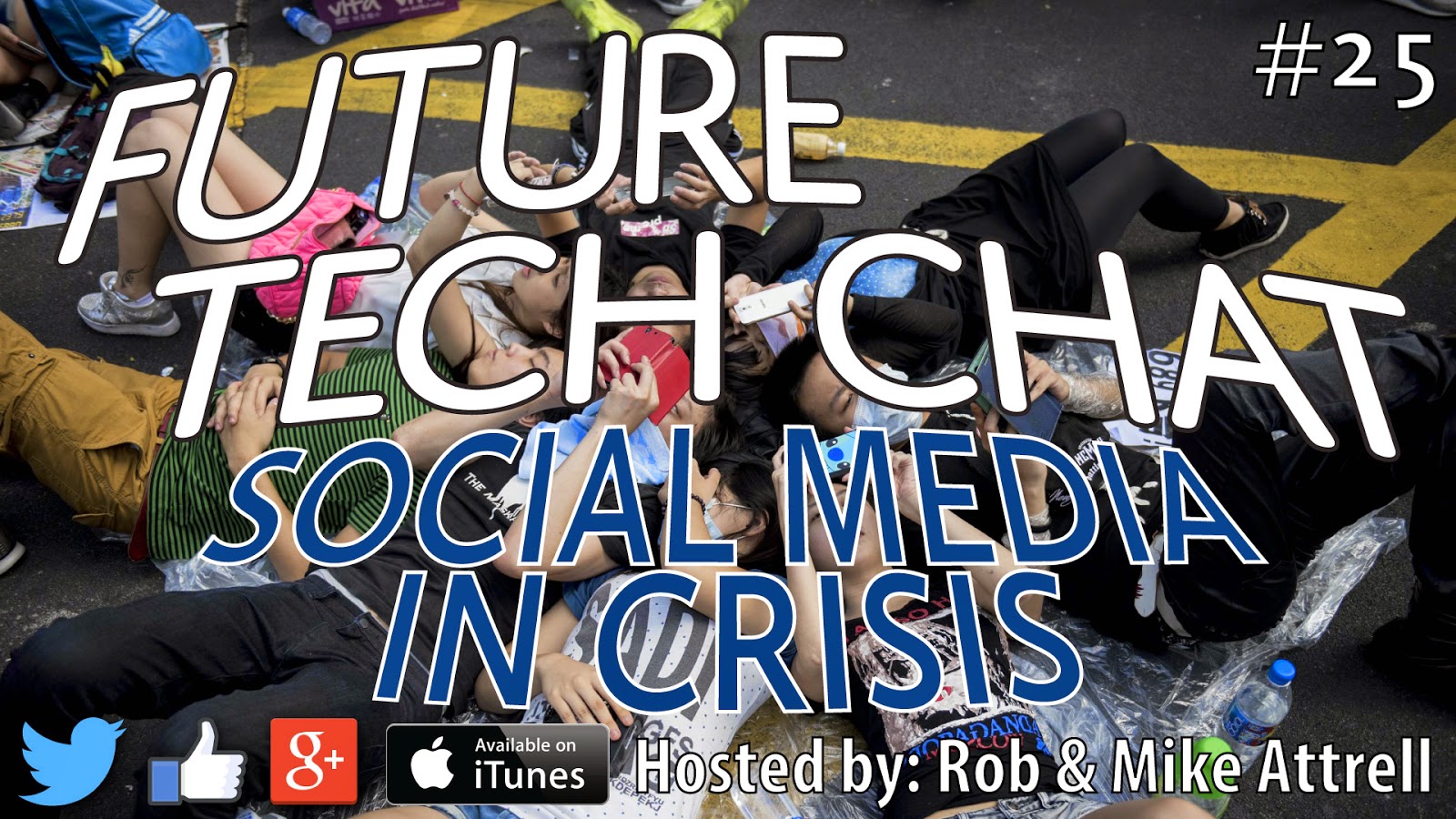This week on +Future Chat, it’s the end of the year, Mike gets throat punched, and we discuss the usefulness of Watson beyond Jeopardy-winning.
Future Chat #42: Happy Saturnalia, Everyone! Subscribe via RSS, on iTunes, or on Stitcher Radio to check it out.
Tag: Technology

Future Chat #42 – Happy Saturnalia, Everyone!

Future Chat #41: That'll Cook Your Phone
This week on +Future Chat, we discussed open science policy, magnetic induction, and Nick imitates uOttawa professors.
Future Chat #41: That’ll Cook Your Phone Subscribe via RSS, on iTunes, or on Stitcher Radio to check it out.
Future Chat #40 – Well That Went Well /s
This week on +Future Chat, missed Nick, talked TekSavvy, and tried out a new show structure.
Future Chat #40: Well That Went Well Subscribe via RSS, on iTunes, or on Stitcher Radio to check it out.
Future Tech Chat #26: Automation
This episode of Future Chat was all about Automation, how robots and algorithms will continue to take human work and do it more efficiently and more quickly. I had some help in the introduction from Alex from the UK, just another great example of automation.
Future Tech Chat #26: Automation
Future Tech Chat #25: Social Media in Crisis
We went topical this week on +Future Chat, discussing how social media can be used and mis-used in crisis. Between protests, emergencies, and natural disasters, there are innumerable reasons social media can be an incredible way to connect people when they need it most.
Future Tech Chat #25: Social Media in Crisis!function(a){var b=”embedly-platform”,c=”script”;if(!a.getElementById(b)){var d=a.createElement(c);d.id=b,d.src=(“https:”===document.location.protocol?”https”:”http”)+”://cdn.embedly.com/widgets/platform.js”;var e=document.getElementsByTagName(c)[0];e.parentNode.insertBefore(d,e)}}(document);
Fake It Show #4: Interview with a Maddox
I had +Nick Maddox in the Fake It studios this week, to talk about his big move from Ontario and grad school, to Alberta and technical college. We also discussed the keys to successful relationships.
Fake it Show #4: Interview with a Maddox!function(a){var b=”embedly-platform”,c=”script”;if(!a.getElementById(b)){var d=a.createElement(c);d.id=b,d.src=(“https:”===document.location.protocol?”https”:”http”)+”://cdn.embedly.com/widgets/platform.js”;var e=document.getElementsByTagName(c)[0];e.parentNode.insertBefore(d,e)}}(document);
An Open Letter to Canadian Internet Service Providers
Dear Internet Service Providers (ISPs),I’m going to attempt to remain as calm as possible throughout this letter, but honestly we’ve all had enough of your ridiculous policies and price gouging.I’ve written and talked about this problem many times before, and 5+ years of crazy and punitive changes to your wireless and home internet packages has left me shaking my head in disappointment at your terrible treatment of your poor customers who don’t know any better.A little about me, I’m not really what anybody would call a “heavy” data user, I just enjoy using technology to its maximum potential in my everyday life. I take pictures and video with my camera phone pretty much every day. I watch shows like the Daily Show and the Colbert Report 4 days a week on my morning and afternoon bus commute. I pay Apple for the privilege of streaming a reasonable amount of music in my iTunes library to my cell phone, tablet and laptop. I also listen to podcasts, 1-2 per day, that have to be downloaded. I download apps too, but certainly not a crazy amount. That being said, ALL of your data calculators are completely unable to accurately predict my wireless data usage, coming in anywhere from 5 GB to 12 GB a month (usually I max out the meter).I’m also pretty technically savvy, and use social media. This means that I back up the photos and videos I take to Dropbox and Google Photos, I check Twitter, Facebook and Google+ a normal amount, and man a few social accounts for projects I’m working on or involved in.I am certainly an advanced mobile user, but I don’t think my Internet usage should really fall too far outside the mainstream if not for your outrageous mobile service plans which gouge customers like me who simply want to connect to the internet at its full potential.Here is a breakdown of my mobile phone usage for September 10 – October 9 (this is now a seemingly typical month):Minutes used: 33:41 mm:ssMessages sent: 39 msgsData consumed: 35.91 GBI recently renewed my plan which I originally got in 2008 which I have been clinging to for dear life, which includes 150 anytime minutes (unlimited eve/wknd), unlimited SMS messages to North American numbers, and what was at the time called “Unlimited Mobile Browsing”. At the time, this was a $5 add-on with my new Sony Ericsson flip phone. I LOVED that phone. Since signing up for this plan, I have moved to a smartphone, and renewed the plan this summer while getting a Nexus 5 for about $60 after rebates.Now, for people reading this who aren’t familiar with my story, you would probably expect that I’m probably paying a lot of money for my plan that can get me 36 GB of data. Using that much data on even the most generous Rogers data plan would cost you well over $300. But in 2008, my plan cost me only $40 (+ 13% HST) per month, and that’s how much I’m paying today. I do the math every 6 months or so and no matter how you slice it, it is worth keeping this plan and buying new phones outright than to switch to a punitive new plan and suffer through curbing what isn’t really extraneous mobile data usage.Companies like you (Rogers, Bell and Telus) have bought up or created smaller brands to attempt to appeal to customers trying to save money, but all you really do to those customers is give them even less than your major brands will give them. Koodo, Solo, Chatr, Fido, Virgin, etc., are no better deals than your major brands when it comes to the tiny amounts of data they get. Even if you buy a plan from Rogers with 30 GB of data (designed allegedly to be shared between a large number of phones/people), that still isn’t enough data for one person with my non-excessive browsing habits.
Good old 2007! I accept that I may be in a particularly unique situation with my high data use in 2014, but this is the way things are going with the internet. We need to be able to transfer data quickly and efficiently on mobile networks. And it’s not like I’m not suffering consequences of being on a grandfathered plan from when the iPhone was a new product running on the EDGE network. I don’t have visual voicemail, which is standard on the new plans. I don’t have access to LTE data, and my upload speed is throttled particularly harshly (I’m not sure if my download speed is throttled, but it’s about an order of magnitude faster than the upload). I can’t tether my tablet or laptop to my phone’s internet connection unless I jailbreak my phone, and I prefer to keep my software up to date than to jailbreak these days.
These policies and tiny data caps are not unique to cellular carriers and networks. DSL, Cable and Fiber internet customers also suffer through some extremely stingy plans. The plan I have been on for the last few months for Cable Internet is fairly expensive, but at least it comes with unlimited data transfer. Before that, for 6 months I suffered through a new cable and internet package that included 150 GB of data per month. That was torture, as I like to download beta software, music, and other media, and my fiance and I love Netflix and basically any other service that means we don’t have to sit down in front of our TV on the hour to watch whatever show happens to be on. I was tiptoeing around to keep under the 150 GB cap for 6 whole months, and it was painful.Right now, you might be thinking “Boohoo, you get what you pay for”, and that I shouldn’t be complaining about something that’s cheap. I understand why you might say that, and I’ve always been very open about the fact that if I’m getting something worthwhile, I would be more than happy to pay a premium for that.However, as is evident in the mobile space, and to a lesser extent in the home internet world, data rates (especially for overages) are completely outrageous and not what any normal person would consider reasonable. Even if we pretend that I’m going to pay for Rogers’ 30 GB plan on mobile (which is $250 a month), that’s not enough data for my typical needs. Beyond the data usage of any mobile data plan, additional data costs $10-15 dollars extra per GB. It has been calculated that the highest estimated cost to an internet provider for a GB of data transfer is about $0.08. In the home internet world, costs are even lower than that, but you can still expect to pay anywhere from $1-5 per GB for overages. This, plain and simple, is price gouging.Now, I hear your customers reading this shouting “Why don’t you just go to Wind, or Mobilicity?” I understand where those people are coming from. To put it simply, I have tried Wind, and though their service is fairly good, the internet is slower than what I would be getting on the Rogers network even on 3G, and if I end up outside their coverage zone, rates skyrocket to as high as $50 a GB, or basically what any customer who is using pay-as-you-go data on Rogers would be using. It also doesn’t save me money from my current plan, but if something ever happens to that plan, I would be going to Wind in a heartbeat.I know that a lack of competition is what is stopping you from lowering your prices. I know this because there are examples all over Canada of people competing with you in small markets, and you have lowered your prices or changed pricing structures in those areas. In Saskatchewan and Manitoba, for instance, you offer very cheap plans with 5 or 10 GB to match the offerings of provincial carriers like MTS and Sasktel. In Ontario, when companies like Teksavvy started buying bandwidth from you in bulk and reselling it at lower cost, you made a plan that you don’t advertise publicly except to TekSavvy customers. The plan very closely resembles the standard TekSavvy plan, and you can make offers like 6 months free on a 2 year contract to sweeten the deal and keep little guys out of the market.Never mind the fact that you 100% pay your Rogers technicians more for service calls to Rogers customers than for TekSavvy service calls, which mean that TekSavvy customers end up waiting days or weeks for technicians who are prioritizing Rogers accounts. That is a conflict of interest if I have ever seen one. If somebody gets fed up with this seemingly bad service from TekSavvy, they can call Rogers, get the same tech out the next day to set up their Rogers internet, and pay more for it. This process is absolutely criminal and I can’t believe the CRTC lets you get away with it year after year.Please, please, PLEASE change your business practises. I am one of 35+ million Canadians who is fed up with the current state of internet service in Canada. I want to buy mobile and home internet from you Rogers, Bell and Telus. I just want to pay a fair price for the data I use, let you take home some profit, and call it a day. That’s all any of us want. But what you’re doing to your loyal customers simply won’t last, and I implore you to give the people who love the work you do pushing internet technologies forward what they want. Plans with more data. Doubling the prices of your plans and offering unlimited minutes across Canada and unlimited SMS is not what customers want, as research has shown over and over again in the last few years. Run a legitimate business, that’s all I’m asking.Thank you,
Rob AttrellA concerned citizen.
Sources:
http://www.forbes.com/sites/tristanlouis/2013/09/22/the-real-price-of-wireless-data/
Generation Why? (Part 1)
The North American workforce is getting older. That shouldn’t come as a surprise to anybody, because the North American population as a whole is getting older. We are living longer lives, and our working years extend further and further into what has long been considered “old age”. As a relatively new member of the adult population of North America, most of my experience working after attending university has come from short stints of contract work.
I have a pretty unique, and diverse, set of skills, and so far no employer of mine has managed to truly use me to anywhere near my full potential. This, perhaps, is a fundamental flaw in the way employment is generally sought today, or it might be a matter of me failing to sell my skills and experiences properly. In either case, I don’t think my situation is unique, or even rare. When applying for an adult job today, the typical process will involve some frantic online searches of job boards, adding a resume to employment sites like monster.com or LinkedIn, and perhaps reaching out to friends and family, either IRL or on social media.

I know that I’ve gotten many of my job opportunities through a variation of this process; since I hit a lot of “standard” job requirements, like a university degree, valid security clearance, and bilingual certification among the most sought-after in the Ottawa job landscape (especially in the public sector). However, through the 5-6 different jobs I’ve done since 2011 when I graduated with a Master’s degree, I’ve yet to really land somewhere where I feel like I am making a real difference in a way that satisfies me. I certainly haven’t had any success in getting a job in a science lab directly, although to be fair those opportunities are generally given to the HUGE number of graduates who got several years of experience in a real wet lab. My chemistry experience consisted mostly of performing simple chemical manipulations on relatively simple substances and then doing a physical analysis of the sample in question to determine its composition and structure (this is called physical chemistry).
When I was finishing high school, all I wanted to do was chemistry. I found science SO interesting and I still do spend most of my time talking and thinking about science and technology. That’s why I went and studied chemistry in university, I wanted to know more and come to a fuller understanding of science and the world around me. If I had the opportunity to go back today, I would probably choose to follow a path similar to Derek Muller, from Veritasium. He has a PhD in science education, and wrote his thesis about the use of multimedia to more effectively educate.
When I graduated at the end of 2011, all I really knew was that I didn’t want to spend my whole life working in academia doing fundamental research. I learned a TON from university, and especially from grad school, but I’m sure the majority of actual science I did there won’t help me much for the rest of my life. Since the beginning of 2013, I decided that I didn’t have any interest in just living out my life, I wanted to control my own destiny and learn to do things that I wanted to do, and to find out what I wanted to do.
One of the weird things I discovered when I finished school is that it’s relatively easy to get a job with a degree, but it’s a lot harder to get a job you actually want to do. I’m of the opinion that everybody deserves to do something they actually enjoy doing, or at least that they are getting enough money to do it that it is worth it for them. One of the hardest things I had to do in my life happened about 6 months after I finished school. I had been working at Canada Computers, an electronics and computer parts store, starting about a week after I defended my thesis. I got the job by seeing an opening, walking into the store, and being hired on the spot after the interview. That felt pretty good. I didn’t know a lot about computers at the time, but I was very interested in technology and excited to learn more. What I did learn was that I need stimulation at work, including working on new things and learning pretty much all the time, or I would be very bored.
So skip to June of that year, 6 months after finishing school, and working in retail full time. I was getting ready to attend my graduation ceremony, and decided that I needed to quit my job. I had a little bit of money saved after my schooling (grad school doesn’t pay all that well, but it was enough with some student loan money), and so I knew I could weather the unemployment storm for a little while, looking for gainful employment.
In the end, it took me a little over 6 months of no work to find a job. In fairness to myself, I took July and August of that year (the first two months) to relax and take the break I never got immediately after school ended. I did work a few odd jobs through that fall with placement agencies, but most of that time was spent applying to jobs, and teaching myself how to code. By the middle of January, I was getting pretty desperate, and I was looking for any opportunity to kickstart my adult life. It was at that time that I reached out to a local band (Sons of Pluto for those interested) to see if these friends I knew were interested in help with a website and social media strategy, since I didn’t have much to do those days.
The very next day, I got an email to meet with my future boss, and in the almost 2 years since, I’ve only had about 8 weeks of unemployment since that day when I reached out to take control of my own life destiny…but that’s just the beginning of the story.
Tune in for Part 2 of this story tomorrow, where I will talk about what I think would be a good way to let new adults entering the work force ease their way in, and about the difficulties I’ve faced since starting that “adult” job in starting my actual “adult” life.
Once you’re done Part 2, be sure to check out Part 3 as well, on basic income and the future of the workforce.

Future Tech Chat #24: Google Y
This week, +Future Chat was all about the future of Google. We talked big picture projects, like building model cities and airport efficiency. We also talked about what big stuff we’d tackle if we had Google’s purse strings.
Future Tech Chat #24: Google Y!function(a){var b=”embedly-platform”,c=”script”;if(!a.getElementById(b)){var d=a.createElement(c);d.id=b,d.src=(“https:”===document.location.protocol?”https”:”http”)+”://cdn.embedly.com/widgets/platform.js”;var e=document.getElementsByTagName(c)[0];e.parentNode.insertBefore(d,e)}}(document);










